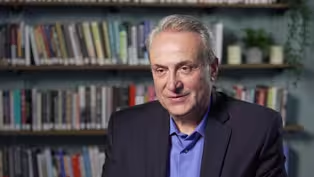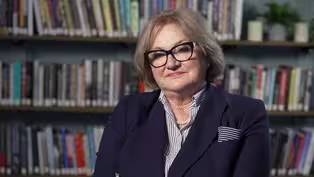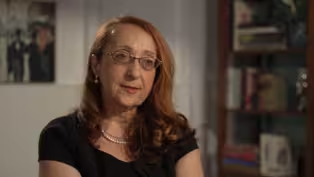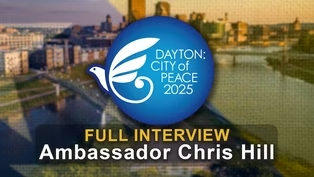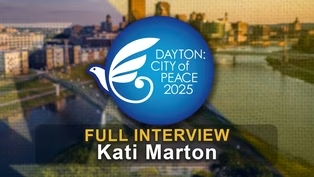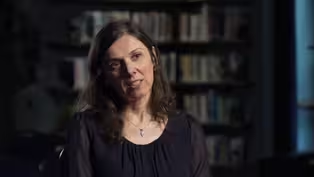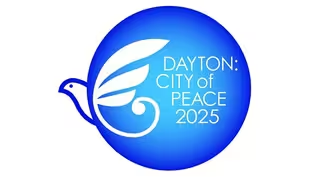
Full Interview: General Wesley Clark
Clip: Special | 33m 17sVideo has Closed Captions
Interview with retired Gen. Wesley Clark on ending the Bosnian War.
As part of ThinkTV's Dayton: City of Peace 2025 project, we continue marking the 30th anniversary of the Dayton Peace Accords, by releasing our full interview with one of the negotiators of the peace agreement, General Wesley Clark. Clark also served as Supreme Allied Commander for NATO Europe, helping to enforce the peace after the agreement. He joins Ann Thompson in this virtual conversation.
Problems playing video? | Closed Captioning Feedback
Problems playing video? | Closed Captioning Feedback
ThinkTV Originals is a local public television program presented by ThinkTV

Full Interview: General Wesley Clark
Clip: Special | 33m 17sVideo has Closed Captions
As part of ThinkTV's Dayton: City of Peace 2025 project, we continue marking the 30th anniversary of the Dayton Peace Accords, by releasing our full interview with one of the negotiators of the peace agreement, General Wesley Clark. Clark also served as Supreme Allied Commander for NATO Europe, helping to enforce the peace after the agreement. He joins Ann Thompson in this virtual conversation.
Problems playing video? | Closed Captioning Feedback
How to Watch ThinkTV Originals
ThinkTV Originals is available to stream on pbs.org and the free PBS App, available on iPhone, Apple TV, Android TV, Android smartphones, Amazon Fire TV, Amazon Fire Tablet, Roku, Samsung Smart TV, and Vizio.
Providing Support for PBS.org
Learn Moreabout PBS online sponsorship- Former nato, Supreme Allied Commander and member of the negotiating team for the Dayton Peace Accords.
Welcome, general Wesley Clark.
- Thank you.
- Take us back to the Bosnian War.
What was the world thinking?
What were you thinking?
- Well, when it first broke on the world scene, nobody knew what it was.
You didn't know where Yugoslavia was.
There were these different parts of Yugoslavia.
There were unpronounceable names, there were Serbs, there were Bosnian Serbs, Croatian Serbs.
There were Bosnian Croats.
It was a very confusing thing for the American people.
- And as you referenced, parts of Yugoslavia were declaring their independence.
Bosnians were feeling aspirational about their own independence.
Why was this a non-starter for the Bosnian Serbs and Melosevic?
- Well, Melosevic actually started this himself by really strengthening nationalism.
When former leader Tito died in 1982, the nationalist tendencies tended to resurface.
And, and the Serbs were the largest of the groups in Yugoslavia.
They had traditionally been allied with the West and World War I, Tito himself was a Croat, but the Serbs had always aligned to Moscow.
And so there was a lot of friction, tension, and uncertainty with the collapse of the, of the Iron Curtain, the breakup of the Soviet Union.
And then, and there was Milosevic who was, you know, brilliant communist lawyer.
And he found his own way forward by stressing Serb nationalism.
And as he stressed it, he put fear in the hearts of the other minorities.
- You were involved in the shuttle negotiations leading up to the Dayton Peace Accords, and at Wright Patterson Air Force Base.
What did it take to get the key players to the table?
- At first, it took the fact of Miloseovic recognizing that his period of military exploitation was ended.
And this was ended by the Croatian military offensive called Operation Lightning.
In the summer, late summer of 1995, before that, the Bosnian Serbs were still, they had Sarajevo locked in a siege.
They had defeated an attempted Muslim breakout of Sarajevo.
And, and so the future was uncertain, but it didn't seem like they were ready to stop.
NATO then began to, to get involved.
NATO forced the UN to take stronger action in response to a massacre of a number of Muslim men that that happened.
And after one of the safe areas was overrun at Srbrenica, and Melosevic began to feel the news tightening on him.
So he was ready to say, I've got enough for now that that's it.
This was the key that allowed us to move forward with a peace agreement.
- And just to back up a little bit, why did it take so long before the world got involved?
I mean, as you were mentioning, we were having genocide.
- Well, the world was actually involved almost instantly.
The United Nations created a protective force.
It was commanded first by a French General, then by a British general.
And it had participants from all over, including NATO members, but also members like from Bangladesh and other places.
The United Nations was in the United States.
United States was not part of this force.
We stood aside, and we saw this going on in 1992, President Clinton, a sailed President Bush, or candidate Clinton, assailed President Bush for not stopping this conflict because it was tremendously damaging.
It caused millions of refugees.
There were horrific pictures of suffering and, and abuse and war crimes coming out of it.
So immediately upon taking office President Clinton, Clinton launched an initiative to stop it.
And he said that what the United States wanted to do was lift the arms embargo that had been placed on Yugoslavia and then assist the Muslims by using airstrikes.
Well, it sounded good, except to our European partners who were on the ground.
They rejected it.
There was another set of peace proposals that was discussed by the Europeans, went nowhere.
Then we sent an American diplomat over in 1994, '95 to try to get an agreement, '93, '94 rather.
And nothing happened out of that.
Charles Redmond ambassador friend of mine tried.
And the, the reason it didn't work is because Melosevic wasn't ready to accept a peace agreement.
And, and so it wasn't until NATO put a grip on it.
Milosevic realized he'd gone as far as he could get with his military force.
And, and he was, he had a keen, keen instinct for survival.
And so at this point, it was like, yeah, okay, well, we'll, we'll listen to what you say.
That's the way it started.
- Why did it take a particular group of American negotiators, including yourself, to really make the difference?
- Because American power was the key to bringing an end to the conflict.
The Europeans simply didn't have the resolve or the military capabilities, public support to stop this.
They were there.
They had rules of engagement that restricted their from taking action except for defensive purposes.
And so there was a continuing round of, of newspapers or stories and video of humiliation of the United Nations.
Really, it was the American involvement.
It was, it was what National Security advisor, Tony Lake told the French.
When we created this and this proposal with the seven principles, we went to Britain, France, we talked to Germany and the eu.
We went to Russia and Turkey.
And as, as Tony Lake explained to the French National Security Advisor we're the big dog, when he said, well, this American proposal, maybe the Elysee French leadership wouldn't like it.
He said, you don't understand.
We're the big dog.
We're promising 25,000 American troops in this.
We're in this, we're gonna stop this conflict.
And so it was the American dramatic leadership expressed by Tony Lake, backed by President Clinton, approved by President Clinton all the way that brought an end to this conflict.
- So how did the military presence in the Balkans serve diplomatic ends, and what challenges did that dual role represent?
- Well, in the first place, the Croatian militaries, I said, was the really the key to convincing Milosevic that he reached the end of the line and, and they did eventually stop the Croatian offensive.
But at one point we walked in and told the Croatian leadership, that's enough.
Stop right there.
Richard Holbrooke made the statement to President Tudjman and Ambassador Jim Pardue.
And I went to the Ministry of Defense.
It was a Sunday morning.
The ministry was dark and the Minister of Defense had come in and said, well, I guess you wanna know where we are in the offensive.
We're about to take in this really key town in Western Bosnia called Banja Luca.
He said, we're on the hill overlooking Banja Luca.
The Serbs are, they're shooting each other.
They're panicked.
We said, Mr.
Minister, you've got to stop.
Hold it right there.
That was the instructions that came out of the White House, because that was the 51 49 division of territory that we had in our proposal.
So we had used the Croatian offensive to get us there.
Once we had the agreement, we had the land, then we had to negotiate the agreement.
The key to the agreement was we weren't peacekeepers, this was peace enforcement.
So the commander on the ground, not the United Nations, not NATO, not the President of the United States, the commander on the ground had the authority to take whatever action was necessary to prevent or punish any violation of the agreement.
And we call that the silver bullet clause.
So this is what really enabled both the Serbs and the Bosnian Muslims, Croats everybody said, stay outta the way of this force because you can't get at 'em politically.
You got in the first place, Admiral Leyton Smith and later General Eric Shinseki, they were there there, general Bill Crouch.
They were there, they were in charge.
And you couldn't, there was no like newspaper reporter that could go to some politician say, oh, this NATO force, they're misbehaving.
Nah uh.
So it was the strong military leadership, the credibility of the United States especially that made this peace happen.
- So that was part of the critical decisions or compromises as you were saying, that allowed the Dayton Accords to succeed.
- Right.
- The negotiations were a delicate diplomatic dance, I guess you could say.
Was there a moment that stood out to you that almost pushed towards collapse?
Can you share your recollections of that moment and how the team overcame that potential failure?
- Well, there were a couple of moments like that.
The first moment really was, that was really significant was when we went to see Melosevic at the start of the negotiations.
And we said, well, Mr.
President, we don't understand.
Are we gonna talk to, to, should we be talking to you?
I mean, you're the president of a different country, or should we talk to these Bosnian Serbs?
He said, oh, talk to me.
He said, think of them as country cousins.
They won't defy the will of the Serb people.
We'll have a, an elect, he called it an election.
What he meant was a referendum on it, and we'll force 'em to comply.
He said, we'll use technology, meaning he was gonna squeeze them and force them to comply.
Which in fact he did.
That was the first one.
Second one is, of course, we had promised that in the agreement that there would be a separate part of Bosnia called Republika Srpska, a Serb homeland inside Bosnia.
And President Izetbegovic really resisted this.
He said, it's the most unjust thing he'd ever heard of.
It's the most unjust of anything you've taken the weaker part of.
You're forcing us to give up part of our country to the aggressors.
It was a terrible moving moment.
But ultimately he did it in response to the promise that there would be elections, that there would be internationally supervised, and that NATO would be there with the ability to enforce the agreement, NATO being the United States.
And that's what it took.
And then at the end, we had to worry about the division of territory.
And it really came down to a town called Bko And what was gonna happen at Bro, because Bro is where it was critical, both to the Serbs and to the Bosnian Muslims.
And in the end, there was a compromise solution that said Bro would, would not be decided which entity it would go to.
It would just be decided later.
And when this was wrapped up, boom, it was all done except for the final division of the line.
And I had to sit at the end with a map with representatives from both sides and draw the line very precisely which village, which piece of land that was associated, which village, which side of the division, and so forth.
And that was the end of it.
It was really built on American credibility and US military technology in mapping.
- I wanted to ask you about that map, 'cause I did read about it.
Tell us in layman's terms, so it sounds like a high tech map, and you know, here the leaders were kind of uncertain, as you mentioned about like what territory was gonna be mapped out.
And then you come in with this map.
So paint us a picture.
- Yeah, we had a, we had a picto map, basically, and you could see the ground in great detail.
You could even imagine yourself in a plane flying over it.
And so you could explain why dividing line had to be on this hilltop versus halfway down the hilltop.
When we had first looked at the division of land, of the 49- 51%, that was presented by Ambassador Redmond in the early summer of 1994.
And I, I got a look at it.
I went into my boss, General Shalikashvili.
I said, look, this is, these lines are not enforceable.
They're not on distinct terrain features.
They're in down the middle of a valley or on the side of a hill.
And somebody just drew it with a, you know, a pencil on a small map.
And when you actually laid it out on a very large scale map, you were gonna have a problem.
You couldn't have a dividing line with Serbs a hundred meters higher on a hill, and then the Muslims a hundred meters below them.
And what, what were we gonna do?
Have a trench, a wall, a, to keep people from seeing and shooting?
It had to go over the top of the hill.
You had to have visible terrain features that were the dividing points.
And so this is what we really worked on it with the Picto map, - You know, thinking back to the Dayton peace accords and the time that you were there negotiating, were there any lighter moments that stick out in your mind?
- We, one point President Milosevic had a friend in New Hampshire who, who told him, he's got to have lobsters.
Have you ever had lobsters, Mr.
President?
And President Milosevic said, no, he'd never had a lobster.
He'd heard about them, but he'd never had one.
He said, I'll bring fresh lobsters.
So this man brought fresh lobsters down, and we sat around in, in the officer's club at, at the airbase.
The lobsters were cooked and served, and here's this big red lobster sitting on Milosevic's plate.
Of course, he didn't know what to do with it.
And so someone had to cut it up and serve it to him afterwards.
He says, "Too much trouble.
Too much trouble."
- That's funny.
- But Milosevic was, he was like, all, he, he was a man infused with his power.
He had, he was a very smart man.
He was, he had a nice sense of humor, but, but he was also a cruel and ruthless authoritarian.
- With all that was going on, when you were Wright Patterson Air Force Base, how aware were you of the community's support of what you were doing and their outreach efforts, like billboards, like even them holding vigils, wishing for peace?
- Well, we, we were aware of it, and it was important, and people went off post, especially the delegates from, from the three factions often went off post.
And when they went off post, these billboards were important.
They were also important for this reason.
As it as, as the negotiations first began, the first meeting with Milosevic, he shows up at the air base.
There had just been a Newsweek article with his picture on the, on the cover saying like, something like Butcher of the Balkans.
It was a really hostile article.
And he looked at Holbrooke, he says, you did this to me.
"You put this on!
You."
And so Holbrooke said, no, no, I didn't.
Of course, Holbrooke probably did do it, but, but Milosevic started with this, you know, antagonistic hostile view.
And it was hard for the Serb group and, and our other friends to maintain that when they went off post and saw the tremendous support from the community.
One of my friends, there was a man who later was, he was the foreign minister in Moscow, Man named Igor Ivanov.
And Igor was off post a lot.
He didn't speak English that well.
He was part of the contact group.
He and I swam together occasionally in the pool, on the, on the air base.
But he was impressed by the friendliness of the community.
- As you referenced earlier, after the agreement was signed, that wasn't the end.
So what was NATO's role in the Bosnian war?
And as an enforcer afterward, - We had to get NATO there.
Of course, now we did have British and French troops there.
They just re flagged.
They took off their Blue Berets from the UN and they became NATO.
But the US troops had to arrive.
Milosevic had said to me, after the agreement was signed, and Richard Holbrooke said, go say, go, go, go.
Say goodbye to Slobo.
Go say goodbye.
He said, I'm leaving.
Go thank him.
So I went to see Milosevic, he said, thank you, Mr.
President.
He said, General Clark, he said, you know, he said, it would be better if NATO were not to come.
Like, we just signed the agreement.
I said, well, they're gonna come.
He said, well, it would be better if they not come too soon.
I said, well, Mr.
President, they'll be there in, in just a few days.
He said, oh, I don't believe this.
And he wanted to make a bet on this, a bottle of scotch or something, about how long it would take NATO to get there.
Of course, he lost the bet.
NATO did come in, and NATO came in in very good style.
They crossed the river, even though it was, the river was at flood stage.
They knew what they were doing.
The troops were disciplined, they looked good.
And immediately all of the hostile activities stopped despite people predicting, oh, you're gonna run into minefields and people are gonna snipe at you and you're gonna, none of it happened.
None of it happened for a couple of reasons.
We had strategic consent from Milosevic.
He wanted the agreement, he, he wanted that agreement because it was his ticket to get the sanctions lifted and get back into the concert of nations.
We had strategic consent from President Izetbegov and from the Croatian group as well.
Everybody wanted this war to end, and they were reasonably satisfied with the conditions under which it had ended, and with NATO's presence there.
So the strategic consent was a big part of making NATO successful.
- So NATO's role in peacekeeping has evolved and will continue to do so.
How do you see NATO in terms of its importance today and moving forward, and how do you see America's role in tandem with NATO now and in the future?
- Well, there's a lot of discussion about this, and under the current administration, I think there's a lack of appreciation for the importance of stability in Europe.
Mr.
Putin would like Europe.
Putin was there.
I went to Russia during the negotiations, the peace agreement, and for a while I had a Russian two star general under my command when I was NATO commander.
And, and, but it was clear that Russia never liked the intrusion of NATO in the United States into Yugoslavia, much less these other NATO, these other nations joining NATO as one of my counterpart generals in, in the Russian general staff told me in '95, he said, "You're coming into our part of Europe."
They didn't like it.
And, but it's not their part of Europe.
And these are independent nations.
And what we believe and what we have strongly believed since really the Woodrow Wilson and the 14 Points of World War I, is, we have nations have the, to choose their own path Under the Russians, they didn't believe that.
They believed they had the right to dictate what nations would do.
And that is exactly what's at root cause of the conflict in Ukraine, today.
NATO stands as a real obstacle to President Putin's ambitions.
NATO stands as the means for assuring stability in Europe.
And NATO relies on the United States and the commitment of the American armed forces backed by the strategic nuclear deterrent of the United States to maintain that stability.
Three times in the past century, the United States has been needed to assure stability in Western Europe.
Each time we've thought about it, questioned it, wondered whether we could survive without it.
We tried not to go in, in World War I, but we did.
After World War I, we said, no more we're tired of these Europeans.
They're gonna have to take care of themselves.
War came again and reluctantly, we went into Europe again After World War II, we thought we'd learned our lessons.
We formed NATO, we sent us troops there.
We believed we had deterred further Soviet expansion after World War II, even though through various artifices and the use of their military, the Soviets took over Poland, Czechoslovakia, Hungary, and other countries in Eastern Europe after the conclusion of World War II.
But now, even after Bosnia, after Kosovo, after stopping ethnic cleansing, after admitting several East European nations to NATO, not because NATO wanted to expand, but because they wanted the protection of NATO, the security of NATO so they could bring economic development and investment to their countries, which they couldn't do if they were subject to the intimidation, the blackmail and, and the corruption that that, that that Russia generates and feeds on.
So that's the story in a nutshell.
And today the administration is questioning whether it's a wise thing for us to be there, what the risk is, what the costs are.
I think most of the American people understand that Russia's still not our friend.
They have a different system of values.
They don't believe in human rights and liberties.
They don't believe in individual freedoms.
We do.
We cherish those.
And, you know, five generations of Americans have fought for those in Europe and the Pacific.
So we're not likely to give 'em up lightly.
- Yeah.
Thank you for that.
Let's go back to the Dayton model and having these three leaders isolated.
Can the Dayton model be replicated and has it been considered for other conflicts?
- It was a, it was a model that was picked as a last resort.
It happened only because previous agreements that were more conventional had failed.
It was tried again for the resolution of the Israeli Palestinian conflict at, with President Clinton at the end of his tenure in office.
It failed there because of Yasser Arafat and the Palestinians, in my view, rejecting a perfectly reasonable solution that was acceptable to the Israelis.
And in many ways, it doomed the two state solution for Palestine.
And so this, this is a model that will work if you have the right leadership to bring people together.
But it does require at least a partial movement toward strategic consent on the part of all the negotiating partners.
They gotta be ready to stop the fighting.
The thing is, right now, Mr.
Putin's not ready to stop fighting in Ukraine.
We, we, we were able to, in Bosnia, use the previous peace agreement efforts to create a, a template, seven principles that then we could negotiate in detail.
Holbrooke called it a combination of mediating and negotiating with the three different groups.
But we started with a sort of these seven principles.
So that hasn't yet been created for Ukraine, but more importantly for Ukraine, Mr.
Putin hasn't realized he can't win militarily, and until he realizes that we're not gonna get his consent to really go into a peace agreement.
- As someone who has served in multiple roles in their career, military commander, diplomat, even educator, what advice would you give to young leaders, military, civic, or diplomatic, or just everyday citizens who wanna help shape the next generation of conflict resolution efforts and continue to work to sustain peace?
- Well, I think the first thing is you have to be willing to commit yourself.
And especially if this is true, if you're a diplomat or a soldier.
And so that means you're not in charge of your own future.
You're going to follow the instructions of those and the orders of those appointed over you or elected over you.
So my generation fought in Vietnam.
We didn't choose to go to Vietnam.
It was, it's what the President told us to do.
And we went, it's gonna be no different today.
You have to have on the ground experience, you have to do your homework.
You can't simply pole vault in from academia, have some interesting theories, and then lay it out.
You have to, you have to really work and build the relationships.
For me personally, I, I made several trips to the Balkans before we did the Dayton peace talks.
I had met many of the leaders, including General Mladic [Ratko] before I had not met Milosevic.
I knew by that time how to pronounce the names.
I understood the roots of the conflict, and I had a good feeling for what the military dimension was, as well as the diplomatic dimension.
I think all these things are important, and I think it's, you, you, you can't put too high a value on experience to just sort of say, I'm good at good with people.
It, it's not enough, really.
You have to have understood what the conflict's about, the history, the ideology, the languages, the culture.
You've gotta take an interest in these people that, that they appreciate.
But also you've got to understand that even if they're speaking English, it's not your English, it's from their mind and what they're thinking.
And so to get the right agreement, you've got to have experience on the ground experience and, and deep knowledge.
When I was with Holbrooke, and one of the nights that we met with Izetbegovi We met in the devastated part of the city of Mostar.
And we hadn't been to Mostar before.
It was in the Croatian area.
It had been terribly shelled and across the river from the Serb side.
And when we went there, it looked like Berlin, 1945.
There were just wrecks of buildings we met in a, a building that had been mostly blown down, three buildings or four buildings away from the river.
So we were safe from sniping, but there was a war going on still when we met there in, must have been in early September, mid-September of 1995.
And Prime Minister Silajdñ told me at the time, he said, these Serbs, he said, I have seen them torture a five-year-old boy.
He said, I cannot understand it.
And I, and I thought, well, I can't understand torture of a grown man much less a five-year-old boy.
And when you get these kinds of impressions from people on the ground, it's not academic.
It's real.
You have to feel them and they have to appreciate the fact that you understand their position.
- So it's been 30 years since the Dayton Peace Accords were signed.
Any final insights to this milestone?
- Well, we never thought it would, it would be unchanged for this long because we knew that when we constructed the division and created the tri-presidency and these institutions, that they could be blocked by one fact or another.
We always hope that there'd be a way of, of reconciling.
And after a period of time, bringing this Bosnia back together as a cohesive nation, if not by legal process, at least by commerce and intercourse between the entities.
It hasn't happened.
And President Dodic is there in Republika Srpska.
He, he is ardent Serb nationalist.
Some say he takes his instructions from Moscow.
He's been unrepentant in blocking efforts to bring economic development and progress into Bosnia.
It's a real shame.
But it also goes to show this, that I think anyone who's interested in, in, in diplomacy and conflict resolution has to appreciate when people are di are, are being killed, their relatives.
Don't forget, it's not a five year process, a 10 year process or a 30 year process of people saying, well, it was a long time ago.
Well, le le le let's forget it and move forward.
It doesn't happen that way, especially not in Eastern Europe.
It's a hundred, 150 year process.
And when I was a young person growing up in Arkansas and I met friends from Georgia, they didn't like General Sherman who had marched to the sea in 1864, a hundred years later, the memory of what he did in Georgia was still strong.
And so got to appreciate that.
In order to set a right, these war torn lands, we have to have a lot of patience.
We have to work for stability.
We have to keep military forces there for a long time to assure security for all parties and promote economic development.
And then maybe not the grandchildren, but maybe the great-grandchildren of those who fought and died will be able to shake hands, forget and go on with life.
- We're celebrating Dayton's role 30 years ago and how it supported the efforts.
How can communities like Dayton in today's ecosystem support peace?
- Well, I think you have to reach out, follow the events, reach out and provide American hospitality.
It's one of the great things about America and and Dayton certainly exemplified that, is we're open.
We're a nation of immigrants.
We've all come from somewhere else, or our families did at one point or another.
And even though we aren't a nation of passport holders, as one diplomat told me, most Americans, they don't travel.
They don't see beyond their own borders, et cetera.
But we do have a tradition of hospitality and openness and friendliness.
And I think that that went a long way to helping us in the negotiations at Dayton.
And I think it's a, a lesson that other communities could take when we're looking at conflicts and troubles and people around the world who look to America for inspiration.
Look to America for help and look to America for guidance.
- So true.
General Wesley Clark, you're a wealth of information.
Thanks for your time.
Thank you.
Video has Closed Captions
Clip: Special | 5m 54s | Adnan, born in Bosnia and Herzegovina, survived the Bosnian War, before moving to the US. (5m 54s)
Video has Closed Captions
Clip: Special | 6m 27s | Azra, a journalist from Sarajevo, started a successful culinary business in Dayton. (6m 27s)
Video has Closed Captions
Clip: Special | 5m 58s | Dr. Alma, a pediatrician born in Sarajevo, tells her story during the Bosnian War. (5m 58s)
Full Interview: Ambassador Christopher Hill
Video has Closed Captions
Clip: Special | 36m 58s | Amb. Christopher Hill interview, marking the 30th anniversary of Dayton Peace Accords. (36m 58s)
Video has Closed Captions
Clip: Special | 40m 55s | Interview with Kati Marton, widow of Dayton Peace Accords negotiator Richard Holbrooke. (40m 55s)
Video has Closed Captions
Clip: Special | 5m 42s | Meet Irena, an educator whose journey began in Konjic, Bosnia and Herzegovina. (5m 42s)
Dayton: City of Peace 2025 Preview
Video has Closed Captions
Preview: Special | 30s | A new ThinkTV-produced honoring the 30th anniversary of the Dayton Peace Accords. (30s)
Providing Support for PBS.org
Learn Moreabout PBS online sponsorshipSupport for PBS provided by:
ThinkTV Originals is a local public television program presented by ThinkTV
